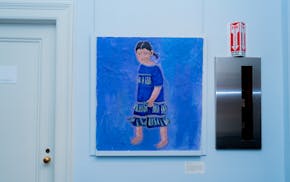It has happened to others, what happened to Anthony Ray Hinton, the author of "The Sun Does Shine: How I Found Life And Freedom on Death Row."
He was 29 and innocent when he was arrested and charged with capital murder after a string of fatal armed robberies in 1985 in Birmingham, Ala. As he was being sentenced to death, he only thought of one person.
"I dropped my head," Hinton writes toward the beginning of the book. "Judge Garrett banged his gavel, and my attorney said some things about an appeal, but my stomach was in my throat and there was a buzzing in my ears like a swarm of bees had been let loose in the courtroom. I thought I heard my mom crying as if in pain, and I looked back to see Dollie and Rosemary circled around her. The bailiffs were leading me toward the door that led out the back of the courtroom, but I turned and started to walk toward my mom. One of the bailiffs grabbed my arm below the shoulder, and I could feel each of his fingers digging in hard. There was no going to her. There was no way for me to comfort her. They would kill me if they could. I couldn't let them. I needed to get back to my mom, and she needed to get me back."
Hinton was freed in 2015 after the U.S. Supreme Court overturned his conviction, and his story was referenced in the 2019 movie "Just Mercy."
His book has been selected for the sixth season of the Mary Ann Key Book Club, named after my great-great-great-grandmother, who was enslaved in Alabama and Georgia in the 1840s and 1850s. Our partnership with Hennepin County Library, Friends of Hennepin County Library and the Star Tribune continues three years after it began with one specific goal: Use education as a foundation for dialogue about the challenges marginalized communities endure and the solutions those obstacles demand.
We're looking forward to seeing you at our author event with Hinton at 6:30 p.m. April 25 at Minneapolis Central Library and then at our panel discussion with formerly incarcerated Minnesotans on May 16, also at 6:30 p.m.
Our incarcerated population is often the most silenced community. A conviction is generally viewed as a guarantee of guilt, regardless of evidence that might suggest otherwise. And even for those who've been exonerated, such as Hinton, the stigma often follows them the rest of their lives.
Our goal with this book and the accompanying dialogue is to highlight the experiences within Minnesota's prison system and the men and women who have been affected by it.
Hinton's story is familiar. A few weeks ago, I wrote about the exoneration of Marvin Haynes, who was convicted in the 2005 murder of an employee at a Minneapolis flower shop. A physical description by an eyewitness did not match Haynes, whose family members said he was at home when the murder occurred. He is free now, and I have since received letters and emails from people in Minnesota prisons who say they are also innocent.
According to the National Registry of Exonerations, exonerated defendants — to date — have collectively served more than 25,000 years for crimes they did not commit. With limited resources available to a significant portion of the prison population, it's unknown how many innocent inmates died long before they had the opportunity to fight their convictions.
But conversations about mass incarceration should not only involve those who deserve to be freed. The effectiveness of the American prison system is also worth discussing, along with the treatment of those who are incarcerated.
In September, inmates at the state prison in Stillwater protested the conditions there, citing concerns about overheated rooms and unhealthy water. The prison population is often the most vulnerable. In 2020, the mortality rate in U.S. jails and prisons increased by 77% compared with 2019 as COVID-19 rates increased, according to a study by Science Advances.
Facing death, Hinton endured every challenge, knowing he was innocent of the crime that cost him nearly 30 years of his life. I think he had every right to feel embittered and angry, long after his exoneration.
Instead, he decided "the sun does shine" through the darkness. I'm not convinced that under the same circumstances I would have found that light. But he did. And his story changed his life and the lives of inmates he helped throughout his time in prison.
"I look for purpose in losing 30 years of my life," he says toward the end of his book. "I try to make meaning out of something so wrong and so senseless. We all do. We have to find ways to recover after bad things happen. We have to make every ending be a happy ending."
Myron Medcalf is a local columnist for the Star Tribune and recipient of the 2022 Society of Professional Journalists Sigma Delta Chi Award for general column writing.

Medcalf: This summer, let's all be more vigilant about our children — and everyone else's

Medcalf: Mia program provides safe space for young people to create

Medcalf: George Floyd's daughter, now 11, on life without her dad: 'It's hard'

